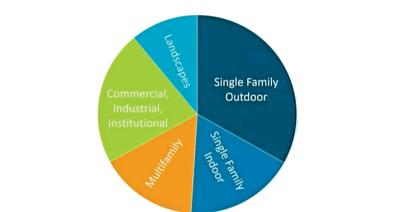Phoenix moves toward tougher water use regulations

By: Ahwatukee Foothills News
Phoenix City Council on Jan. 18 directed city staff to begin developing tougher water conservation requirements for new developments.
Those requirements could include higher standards for pools as well as separate meters for them and all outside water use, a requirement that large consumers to recycle at least 30% of their water on site requirements for more detail on conservation plans in zoning applications.
But Councilwoman Laura Pastor also urged city staff to begin working on more rigorous conservation requirements for existing water users as well, stating, “we’re in a bigger crisis than what we think we are.”
“I also want to look at current development…and what industries we would like to attract that don’t require a lot of water usage,” she said.
Councilwoman Debra Stark agreed, telling Water Services and city planning staffers, “I think maybe as you go through the process, if you could just give us like a quarterly report on what you’re doing with your recommendation so we know what’s going on in new development, but then maybe regroup and discuss about what we can do for existing development because I agree that’s critical and I know we’re all under the gun and I know you guys probably feel it more than us.”
The hearing that followed an earlier memo to the council from Deputy City Managers Karen Peters and Alan Stephenson as well as the Water Services and Planning and Development departments, officials stressed that Phoenix “can no longer depend on receiving its full allocation from the Colorado River” and that “a supply sufficiency is likely in the future.”
“To adapt to a challenge of this magnitude, the City will have to embrace its heritage of water-problem solving,” they wrote. “Only by adopting institutional water conservation policies will the City be able to maintain a pattern of sustainable growth and efficient water use.”
During the hearing, city Water Conservation Coordinator Maxwell Wilson, said the city already is looking to further strengthen conservation measures already in place for all users.
He explained that single-family homes comprise the single largest group of water consumers in Phoenix and that water outside homes represents a third to a half of all water they use.
He said the city already running programs aimed at encouraging voluntary water conservation and that one includes working directly with landscapers.
Wilson also said the city is working with homeowners to encourage replacing grass with turf, although Pastor expressed concern about those recommendations, noting some types of turf actually consume more water than natural grass.
The policy document describing those measures said future zoning cases will be expected to “address best practices related to water use” that will be “evaluated for appropriateness on a case-by-case basis.”
Those practices could include a requirement for water-efficiency certifications, drought-tolerant landscaping, restrictions on the use of turf, green infrastructure and low-impact development for surface parking, streets and sidewalks, preservation. of open space, enhanced swimming poll standards that would include their size and location as well as separate meters for all outdoor water use, and even a project’s impact on water rates.
Those factors would be balanced against “whether the project is a key industry identified as significantly beneficial to the city’s economy.”
“Based on these evaluations, the City may determine the project is incompatible with available water resources, consistency with planning documents or an insufficient economic benefit to warrant the large water use,” the memo states.
The memo does not indicate a timetable for adoption of the standards, which were to be discussed this week by City Council. However, the fact that a draft ordinance already has been submitted indicates their adoption is imminent, although they still must be aired at a public hearing.
The new standards also would require city planners to give an “increased level of scrutiny” to developers’ requests for annexation of land outside the Water Services Department’s service area that they want included in their project.
The proposed guidelines say such requests “should be discouraged to ensure that water resources are focused on areas within the current service area.”
The 30% recycling requirement would apply to any residential, commercial or industrial development that consumers at least 500,000 gallons of water a day. That recycled water would have to be used either on the site or directed to a specific project identified by the developer.
The memo also details what the city has already done over the years to ensure an adequate water supply as well as its conservation measures.
Most recently, the city voluntarily agreed to forego 30,000 acre feet – "an acre-foot is roughly a year's supply of water for three to four households – and is completing a “drought pipeline to more efficient transport water to those parts of the city that rely on Colorado River water. About 40% of Phoenix’s overall water supply comes from the Colorado.
Stressing supply “is only one side of the equation,” the memo said that for decades Phoenix “has made significant progress in demand management and conservation” that date back to 1980.
As a result, it says, per-person water use has fallen by 30% over the last 30 years while demand since 2000 has fallen by more than 19,000-acre feet.
The city also has adopted 12 new conservation programs with a goal of reducing per-person water use to 155 gallons a day by 2030.
Categories
Recent Posts










GET MORE INFORMATION
